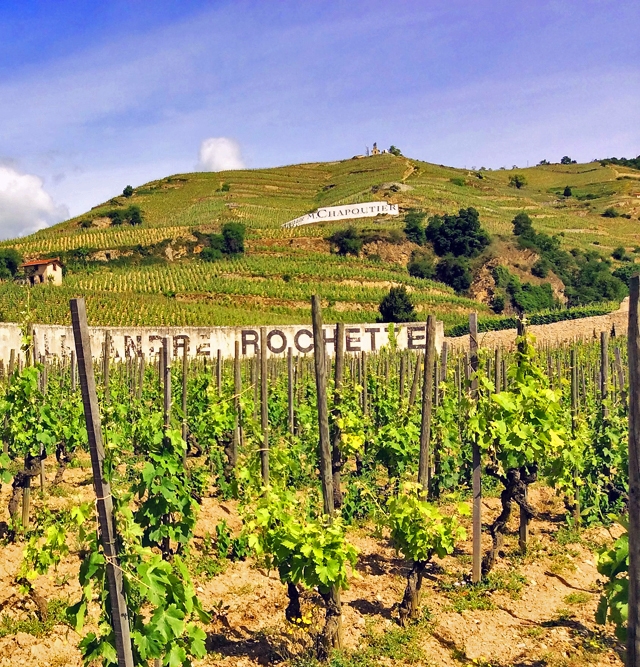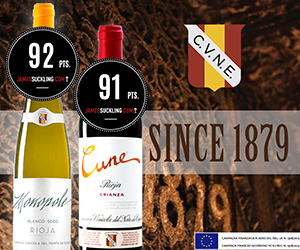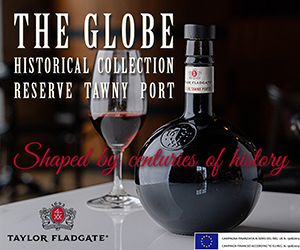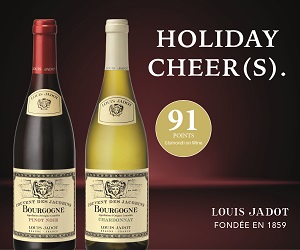We haven’t experienced a year of such high temperatures for a long time.
The last ones were 2005 and 2003, but there is now 2015 to be reckoned with: a year destined to become legendary and an exceptional vintage in the making. Unlike in these other vintages, the heat was not of the same intensity across all parts of our estates, and on the positive side we were able to benefit from our previous experience, which helped us to cope with the difficulties of managing the heatwave conditions. We now have a year that is coming to an end with wines of exceptional promise.
The job of the winegrower is in no way monotonous or repetitive, with each season presenting its share of the unexpected and need for adaptation, but the anchor point is the start of the cycle, which marks a significant moment for us, and so on 19th January 2015 vine pruning begins on the different estates. The mornings have already been cold for some days, but temperatures will rarely descend below -5° over the course of the winter. Just a few snowflakes here and there to decorate the landscape. The months of January and February bring heavy rain (240mm compared to around 100mm normally) ensuring good water reserves which will prove very useful later in the season.
The thermometer rises very little in February. The teams continue pruning and burning the vine cuttings, followed by a final group who pass through the vines to coat the open cuts with a protective preparation of whey and cow horn manure. At the beginning of March pruning is practically finished everywhere and, little by little, the atmosphere starts to warm up. But the average daily temperatures still have difficulty exceeding 10°C; March remains chilly and the vegetation is slow to shoot. Bud break only begins around 15th/20th April in the Rhone Valley, although the previous year it had been almost three weeks earlier. It’s a widespread phenomenon: the apricot trees that we use as a reference are also late blossoming. The season therefore commences in a decidedly leisurely fashion.
A Spring awakening… marked by the Mistral. Once the good weather arrives in April, and the temperatures increase, the vines start to grow rapidly… very rapidly. We even see growth of 40cm in just one week! From this point on things accelerate considerably. The first treatments in the vines are barely completed and it’s already time to start the second lot to ensure that all the shoots are protected.
Work on the growing vines carries on at an incredible rate, and we have begun tying up when, after a period of fine, calm weather, a fortnight of wind in the form of an extraordinarily violent Mistral hit the Hermitage, causing temperatures to drop from 18°C to 12°C on average, just when flowering is about to begin. From Châteauneuf to Tain, reinforcements to the teams are brought in urgently. The vine shoots, which are growing at an incredible rate, need to be tied in as quickly as possible to avoid breakage. It’s not the Mistral itself that surprises us, nor its violence – even though the Hermitage hill usually offers its protection – but, even at Châteauneuf which is accustomed to this north wind, it is the vegetative growth that is preoccupying us as the shoots battered by the wind bend and snap.
Fifteen days of trepidation in the vineyards, kept under control by constant vigilance and reactivity.
Flowering, which has caught up after a late bud break, starts at Châteauneuf du Pape, Tain l’Hermitage and Ampuis, similarly to the previous year but, all the same, with a good three weeks advance on 2013.
Thanks to the wind, the month of May turns out fairly dry, which is a real advantage in the fight against mildew.
The beginning of June is very hot, with temperatures rising to around 30°C. The atmosphere is heavy and electric, and one of the rare storms of the year breaks out on 7th June. There are a few episodes of hail in the Ardèche and the north of the Drôme, but without serious consequences. With the berries still at the size of lead shot the hailstones pass through the clusters without causing damage. More rain falls on 12th June, followed by a very hot spell. The lack of incidence of downy or powdery mildew takes the pressure off, and everything is looking good. Only an extremely virulent outbreak of black rot in the southern Rhone Valley, notably at Châteauneuf, is a little worrisome, but with the advent of the hot, dry weather its progress is rapidly checked.
It’s hot, terribly hot … and suffocating… Between 26th June and 17th July, temperatures reach 35°C daily, with no forecast of rain. We sense that the vines are being affected by the heat, but they resist well and the shoots continue to grow, which means that water reserves are still present. In some of the poorer soils, such as at Les Bessards where the vine roots grow in cracks in the granite, we can already see the first signs of defoliation. The teams spray with infusions and camomile and yarrow tisanes at the end of the day to soothe the symptoms of scorching and bring relief to the vines. The first grapes start to change colour at Tain in the week of the 14th July.
The teams work together unremittingly to water the young plants and stop them perishing under the burning effects of the sun. On 23rd July the potentiometric sensors in the soil begin to alert us…. water reserves are now at zero in the Ardèche, at Ampuis, Condrieu and certain parts of Tain. Paradoxically, it is hot at Châteauneuf, but less so than at Ampuis and Chasse sur Rhône. Yet the basalt at Mirabel gets the better of us and obliges us to put our “heatwave plan” into action. The onset of defoliation and grapes that are starting to show signs of arrested development mean we have to water this Vin de Pays. It doesn’t take much, but a few litres in addition to the tisanes unblock the vines and they begin to mature with remarkable speed.
At Chasse sur Rhône the foliage is scorched by daytime temperatures that reach peaks of 40°C, and hot nights when the thermometer doesn’t descend below 25°C. At this stage we have to sacrifice a few bunches on certain vines that were declining in order to ensure their survival. In any case, if we had not acted, the vine itself would have cut off supplies to the fruit.
It is therefore in the midst of the heatwave that the first teams leave on holiday, wondering what they will be coming back to. Will things have advanced as planned? Will the vines survive this heat? The advantage is that there is no fear of cryptogamic disease. Welcome rain on 14th August is like a breath of fresh air for the vines. Temperatures drop slightly and things accelerate, with growth starting up again and maturities developing fast. Our first maturity checks are done on 17th August. The degrees are low but we note already that acidities are also low for this stage of maturity, which puts us on our guard. We don’t want the degrees to go too high, or to lose too much acidity, and above all, we mustn’t get caught out by our automatic reflexes, because the heatwave is now compensating for the initial precocity.
Daily tours begin in the vines to check the evolution of the berries and, the more we progress, the more surprised we are by the advancement of certain parcels compared to others, and by the acidities, which are beginning to plummet and are becoming disconcerting at tastings. We can see signs of hydric stress in certain zones of Saint Joseph and Le Méal, and some unsettling signs of blockage. Unfortunately, we can’t do a great deal with no water falling from the sky… We can only brave it out and carefully watch the vines’ progress.
Precocity isn’t always to be found where we are expecting it. Whilst at Châteauneuf everything is progressing normally, it is Ampuis that creates the surprise with well advanced maturities, not to mention the Ermitages. For although the heat, sometimes extreme, has indeed created hydric stress in certain areas and accelerated maturities, it has above all also allowed cooler, later ripening areas to mature well. The Viognier at Mirabel has caught up after its slow start, and harvest commences on Saturday 29th August with Les Coufis. On Monday 31st August, we begin picking in Tain l’Hermitage with part of Les Murets (De L’Orée) and the Saint Joseph white (Les Granits), a good week in advance of most years.
After checking practically every plant, such was our surprise, we set the date of Wednesday 2nd September for the first day of harvesting for L’Ermite white. Once we get over the surprise, we have to acknowledge that what we are seeing here is the unique 2015 effect. A month earlier than normal, a parcel which is usually the latest ripening and the last to be brought in is now perfectly ripe, with superb little golden Marsanne grapes that have perfect balance. In the heights of the hills a certain freshness prevailed and L’Ermite positively benefitted from the heat. Exceptional!
Meanwhile, in Condrieu, we are busy picking the Coteau de Chery, which has also profited from the heat to reach maturity several weeks in advance. On Thursday 3 September: a few clouds cool the atmosphere and we proceed with picking Le Saint Péray Hongrie. Paradoxically, the parcel which is usually the earliest, Le Méal white, is only harvested on 4th September. Le Méal surprised, even astonished us. Because of its orientation and its terroir of round pebbles and alluviums the berries evolved differently depending on the height at which they were growing on the hillside, which gave us an extremely well balanced and fresh wine.
After a final tasting of the berries, we also confirm picking the same morning for Chante Alouette, which is showing generous and expressive aromas with notes of acacia honey. Following a weekend during which the Mistral significantly cooled the air and accelerated ripening, we tackle the last slopes of Les Murets and the plateau (de l'Orée) on Monday 7th September. While a few shrivelled grapes and some blockages noted on the reds were posing us a few questions, the few millimetres of rain that fell on 24th August and 1st September had a spectacular and amazingly restorative effect on the vines. For these precious drops allowed them, as if by magic, to restart growth and re-establish an exceptional sugar/acid balance in the grapes. This allows us to start picking the reds on Wednesday 9th September with the red Saint Joseph (les Granits). It wasn’t enough this year to rely solely on the degrees and the analyses, and rushing into the harvest would have run the risk of making unbalanced wines.
Next, against all expectations, La Mordorée with its two ‘côtes’: blonde and brune, is ready, absolutely ripe with perfectly balanced acidity. It is therefore three weeks in advance, on Thursday 10th September, that we bring in La Mordorée and also the Coteau de Neve. The ambiance is very cheerful at Ampuis because this is proving to be an exceptional year, with the heat largely assisting the maturity of these late ripening areas. The Côte-Rôtie will without any doubt rank among the great wines of this vintage.
And at the same time we pick the first syrahs at Châteauneuf…it’s as if the south and the north were inversed this year: we began in the extreme north and are descending little by little to the south…it’s incredible, freaky, but amazingly exciting to experience such atypical vintages. And, like the white, the red L’Ermite reaches full maturity a fortnight ahead of normal, even before Le Méal… what a completely crazy harvest?
Picking L’Ermite is always a great moment and a solemn ritual. The berries, which are consistently small, are deep black and stain our hands. We take our time almost religiously to profit from this divine spot. Saturday 12th September: L’Ermite red arrives in the cellar. And it is on the opposite bank of the Rhone, with Le Clos, that we conclude this day before moving on to the slopes of Le Méal red. Tuesday 15th September: after a last tasting of the berries at dawn, we get to work at Le Pavillon. First of all, we have to climb the hill on foot before starting to pick. Then comes the ballet of pick-ups that take the grapes from the hillsides to the cellar. This harvest is spectacularly beautiful, not to mention the grapes, which already show the potential of a Grand Pavillon.
Friday 18th September: Yannick Alleno and his team join us to pick Guer Van and, at the same time, we make preparations to start picking the Grenache at Châteauneuf. Saturday 19th September: we begin the morning with Les Greffieux, then Varogne, finishing the harvest of Hermitage 2015 on Monday 21st September with the plains of Bessard.
But it’s not all finished yet and we summon up all our energy to concentrate on Châteauneuf, where a very great year is also in prospect. The Grenaches have ripened very slowly, which is beneficial in avoiding the explosion of degrees before phenolic maturity is attained. We wanted to make the most of the days of sunshine and the week of Mistral to attain excellence, and we have done it. On Saturday 26th September we enter into the vineyards covered in round pebbles to harvest Barbe Rac.
Monday 28th September: harvesting continues with Croix de Bois, and we motivate the teams to move fast, because rain is forecast for Tuesday evening. Tuesday 29th September at 15.10 sees the cutting of the final grapes of the season, with 2015 proving to be a very successful harvest! In the cellar, fermentations are reaching their peak activity, and with one pumping over to the next, the work of crafting the wine reaches its climax at the beginning of October. Although the hot weather and the lack of rain during the season went against all the usual rules for a great vintage for white wines, the early harvest allowed us to procure ripe and supremely balanced white wines. And in confirmation, the oxidoreductive balance and the oak integration is elegant, with a fine expression of minerality.
Whilst the whites are still fermenting at this stage, we can share with you our tasting notes and our first appreciations of this 2015 vintage.

 quicksearch
quicksearch






